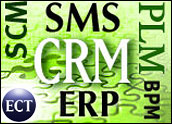
The end of the year is always a good time for top ten lists andforecasts of things to come. It’s a way for analysts and pundits to showhow smart we are and that we “knew it all along” — or at least toexhibit our 20/20 hindsight.
Here are my observations of what was important to CRM this year.
- Tom Siebel stepped aside as CEO of the company he built. At onepoint the company was the fastest-growing software company in history,booking a cool $2 billion in revenues in its best year. Recent yearshave shown a steady revenue decline as the software industry in generalsuffered a hangover from the end of the millennium. But Siebel Systemsremains a significant competitor and a very good innovator in the CRMspace. CEO Tom Siebel became a lightening rod, a man everyone had anopinion about — and frequently the opinion was not positive. He remainsinfluential as chairman of the board, and out of thespotlight he continues to help shape the company’s direction. We haven’theard the last from him.
- Oracle did not buy PeopleSoft. Weren’t we talking about this a yearago? No matter, try as it might, Oracle still has not closed the dealdespite clearing court hurdles and Craig Conway’s stepping aside as CEOof PeopleSoft. When Conway left it was expected that a deal would beforthcoming, but to date there has only been haggling over price.Haggling is frequently the last phase in a sales process. Let’s hopethis gets off the front pages in the new year. Personally, I still thinkthis is the wrong move for Oracle.
- Salesforce.com had a successful IPO, and so did RightNow. Nothingproves your legitimacy like publicly listing your company, andSalesforce did it in style by choosing to list on the NYSE — which hasmore stringent requirements — rather than on NASDAQ. Now CEO MarcBenioff has an even larger audience to proselytize about the benefits ofnot being a software company. As a reward for its efforts, Salesforcewas promptly sued by shareholders unfamiliar with the very differentbusiness model of hosted applications … er … services. MeanwhileBozeman, Mont.-based RightNow has introduced sales-oriented productseven as Salesforce.com has brought to market a hosted call centerservice. No doubt we will see increasing competition in the on-demandspace in 2005. Regardless of what happens, these IPO’s were watershedevents that confirmed the category and opened the way for newcompetition.
- Speaking of on-demand, additional entrants in the hosted CRM market –Siebel, Entellium, Aplicor and others — showed that the business modelthrives, just two years after many analysts had given it up for bubbleroadkill. More importantly, though, each offers what is now pretty muchuniversally referred to as “on-demand” services, and each has verydifferent ideas and plans for targeting the market. Among other things:Siebel offers a hybrid strategy to large and small companies, Entelliumwants to be the low-cost producer, and Aplicor offers powerful workflow toaugment its suite.
- Siebel decided the hosted market was so important that it had topurchase its way into it. Siebel paid north of $50 million to buyUpshot, a pioneer in hosted SFA. The acquisition was made largely forthe people and expertise that Upshot had developed, though some of theUpshot functionality found its way into the Siebel product as well.There was no net reduction in competitors, because Siebel entered themarket at the same time it took out Upshot. Siebel also bought Ineto, acompany with hosted call and contact center technology, to help round outits hosted CRM offering. Going forward, look for a major battle todevelop between Siebel, Salesforce.com and RightNow for the hostedcontact center.
- Siebel’s partnership with IBM on hosted CRM brought a new term intothe CRM vocabulary — “OnDemand.” This alliance could have roughly thesame effect on CRM that the IBM PC had on an earlier market.
- Our survey showed that marketing applications continue todemonstrate their importance, especially in small and mid-sizedcompanies. These companies say that marketing applications have equal orgreater importance to their efforts to capture the voice of the customerand improve customer retention than other CRM components such as salesand service applications.
- We identified a new category of hosted application which we called”Web Necessary” because these applications incorporate the Internet intheir value propositions to a much higher degree than earlier hostedapps. Web Necessary applications have three general characteristics:They involve the Internet as an active part of the value proposition;they support innovative business processes that in most cases could notbe easily supported any other way; and they are collaborative, bringingtogether people from disparate roles, geographies and organizations toparticipate in these business processes
- Salesforce.com upped the ante as it introduced new services. We’vealready mentioned its hosted call and contact center, and it also tookon Microsoft by introducing a revamped version of its Sforce hosteddevelopment platform to include CustomForce.com, which enablesdevelopers to build and maintain hosted applications that use thecompany’s core functionality. Salesforce.com refers to this new model as”client-service,” and we expect it to be an important part of shiftingthe paradigm for the enterprise software industry. CustomForce should goafter the same market as desktop products and tools like MicrosoftAccess — small, in-house-developed applications. But down the road lookfor more direct competition between this hosted development facility andtraditional tools and databases.
- Salesnet, another pioneer in hosted CRM, opened up its API andintroduced an innovative reseller program. Early results were strong asseveral resellers customized the service for specific vertical markets.This approach offers an interesting and viable contrast to Salesforce’sSforce and CustomForce approaches. And unlike Salesforce.com’s approach,Salesnet’s has a more direct path to revenue for partners.
Granted, other things happened in CRM this year that could be calledout. But from where I sit these seemed to be some of the more importantissues we have faced in the CRM industry.
If you have other ideas, drop me a line.
Denis Pombriant is former vice president and managing director of Aberdeen Group’s CRM practice and founder and managing principal of Beagle Research Group. In 2003, CRM Magazine named Pombriant one of the most influential executives in the CRM industry.























































